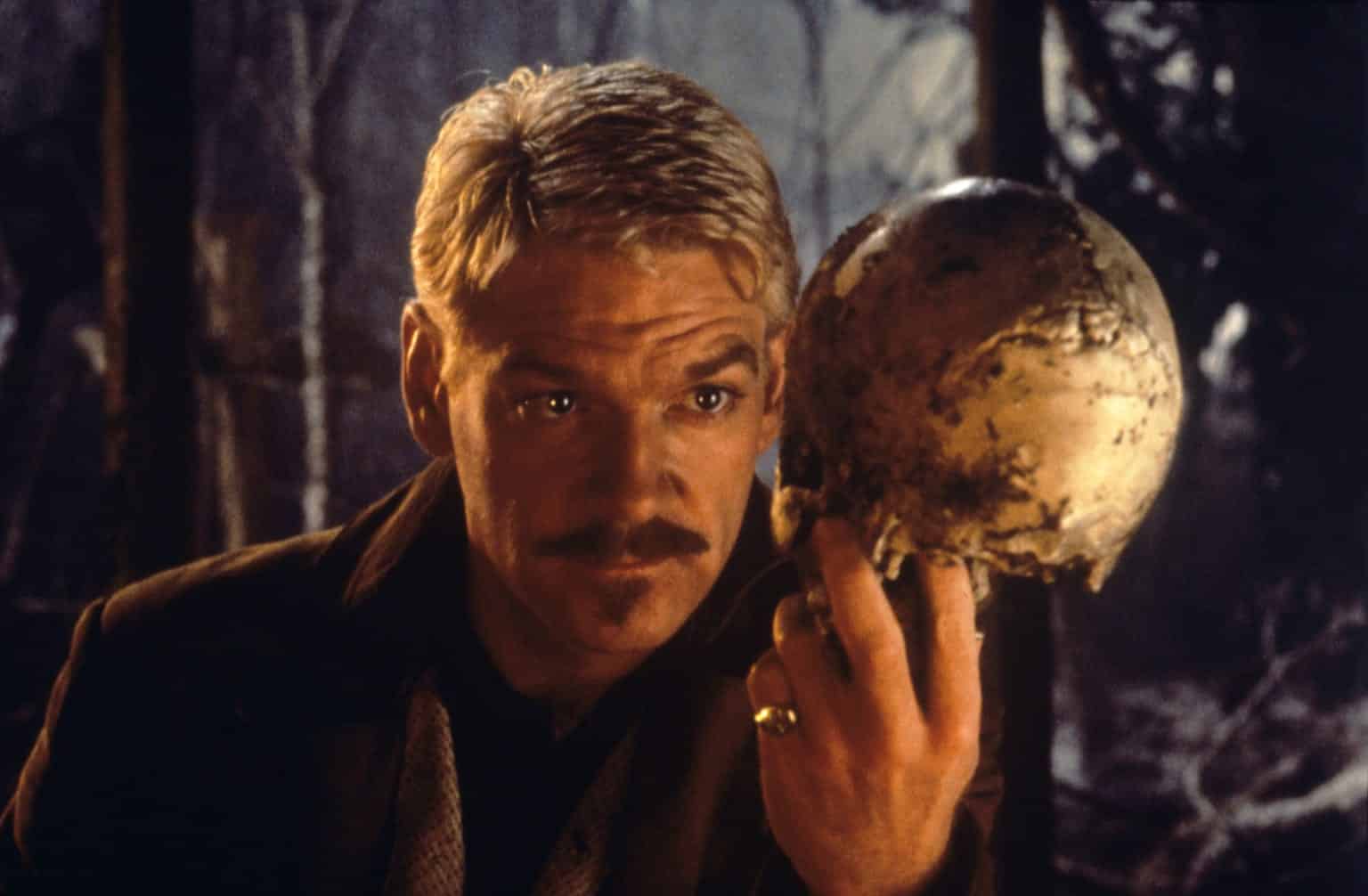We Shall Never Know His Likeness Again
'Alas poor Yorick! I knew him, Horatio' spoken by Hamlet is one of the best known Hamlet quotes. In fact, it's one of the about quoted lines in all of Shakespeare – probably the most iconic prototype connected with Shakespeare in our culture is that of Village property a human skull, dressed in black, with the caption, 'Alas, poor Yorick.'
Read on for Hamlet'due south total 'Alas poor Yorick' quote below, along with a modernistic English explanation and analysis.
'Alas poor Yorik' monologue spoken by Hamlet, Hamlet Act v Scene one:
Alas, poor Yorick! I knew him, Horatio: a young man
of infinite jest, of most excellent fancy: he hath
borne me on his back a thousand times; and now, how
abhorred in my imagination it is! my gorge rims at
information technology. Here hung those lips that I accept kissed I know
not how oft. Where exist your gibes at present? your
gambols? your songs? your flashes of merriment,
that were wont to prepare the tabular array on a roar? Not one
at present, to mock your ain grinning? quite chap-fallen?
Now go yous to my lady's chamber, and tell her, permit
her paint an inch thick, to this favour she must
come; make her laugh at that.
'Alas poor Yorik' meaning & assay
After a long period of emotional upset and indecision about what to do with the noesis that his uncle has murdered his father, Hamlet returns to Kingdom of denmark from a voyage to London. He has survived a plot to have him murdered in England. He's been rescued by pirates, who invaded the ship, and is now home and ready to bargain with the trouble.
In the meantime, his lover, Ophelia, has committed suicide. Hamlet and his friend, Horatio, are walking through the cemetery where two men are digging her grave. Hamlet and Horatio stop to chat to them and Hamlet shows an interest in the skulls that they have uncovered. The gravediggers talk jokingly nigh the people they once were.
I of the gravediggers points to 1 of the skulls and says that it's been in the earth for twenty-3 years, Hamlet asks who it was and they tell him information technology was the rex's jester, Yorick. Hamlet picks it upward. This is where he says, 'Alas, poor Yorick.'
He turns to Horatio and tells him that he knew Yorick well every bit a child. He tells him that he remembers how funny he was, how he rode piggyback on Yorick'southward back a thou times. He finds it a sobering thought that all those jokes, that singing, the flashes of merriment that set the rex's guests on fire at the dinner tabular array – all that has come to this, a grinning skull, covered with muck.
This is a cardinal scene in the play because it draws so many of Shakespeare's themes together – death, decay, abuse which, in this case, is concrete, graphic and dramatic, pointing to the social and political corruption that streams through virtually every line of the play.
It is also a commentary on the futility of life itself, as information technology e'er ends in this mode. He reflects on the falseness of women, as he sees them, in that however much they may plaster their faces with makeup they will all finish upwardly similar this skull, and they could acquire a lesson from Yorick. This is once again a graphic paradigm reflecting a moral state, echoing his assertion regarding his mother'southward betrayal of his male parent: 'frailty, thy name is adult female.'
Hamlet reflects that even the greatest men, Caesar and Alexander, have come to this, returned to the earth and been transformed into clay. Stoppers for the bungholes in beer barrels are made of clay and perhaps those great men may now exist stopping bungholes in beer barrels. That is the case for all of u.s..
And and then, 'Alas poor Yorick' is the framing of some very of import reflections on life, death, abuse, relationships and social rank in the play, Hamlet.
Sentinel & Hear Hamlet'due south 'Alas Poor Yorick' Monologue Performed by David Tennant
'Alas Poor Yorick' Commonly Asked Questions
Who is Yorick?
Yorick was the male monarch's jester, who Hamlet knew well as a child. Part of the quote is Village saying that he remembers how funny Yorick was, and how he rode piggyback on Yorick's back a thousand times.
Who is Horatio?
Horatio is Hamlet'due south friend. The two are walking together when they enter the cemetery and come up across the gravediggers and Yorick'due south skull.
Why is Hamlet'due south monologue oftentimes misquoted equally 'Alas poor Yorick! I knew him well'?
The correct quote is 'Alas, poor Yorick! I knew him, Horatio', but ofttimes suffers the same fate equally other Shakespeare lines that are misremembered, in this example as 'Alas, poor Yorick, I knew him well' – which is not quite correct
Read more Shakespeare monologues >>

British actor and director Kenneth Branagh holding Yorick'southward skull, about to recite the 'Alas, poor Yorick' monologue (Photo past Mondadori Portfolio via Getty Images)
Source: https://nosweatshakespeare.com/quotes/monologues/alas-poor-yorick/